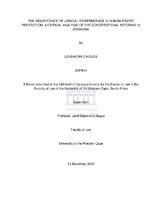The significance of judicial independence in human rights protection: A critical analysis of the constitutional reforms in Zimbabwe
Abstract
The primary basis of this construction is that one of the roles of the judiciary is that of enhancing and protecting human rights. This is an important function which is best implemented through judicial independence. Across Africa and most notably in Zimbabwe, political interference has been noted as a factor that limits judicial independence. The judiciary‘s lack of independence has made it impossible for it to protect human rights in Zimbabwe. This signifies that a new approach to judicial protection of human rights in the country is required. Constitutional reform could be the appropriate legal tool to achieve this objective. Zimbabwe has undertaken constitutional reforms which may help in addressing the human rights situation in the country. These reforms have captured legal principles which will ensure an improvement in the human rights situation. Key to the reforms, has been the independence of the judiciary. The Constitution guarantees the independence of the judiciary. Despite such guarantees there are a number of challenges with regards to this independence. The aim of this research is to show what measures need to be taken for the judiciary to adequately protect human rights and to
establish other measures that can be taken to address the human rights issues in
Zimbabwe

